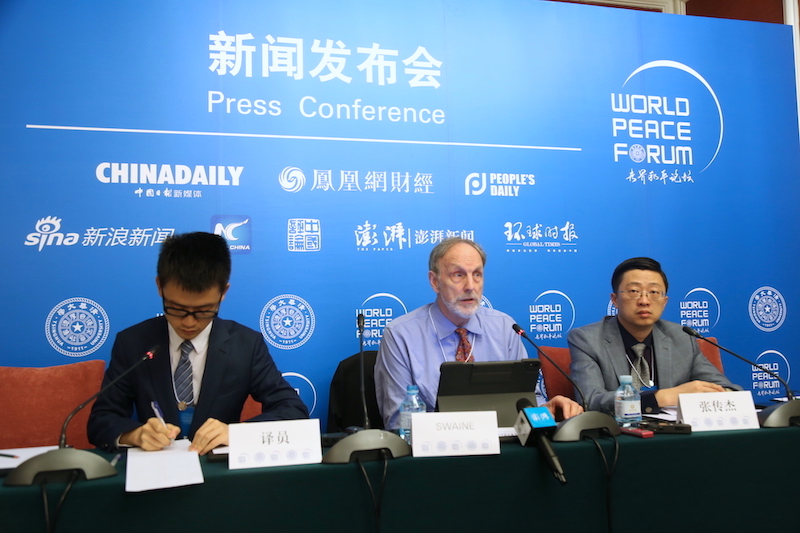
Michael Swaine (middle) speaks at a press conference at the 8th World Peace Forum in Beijing. (Photo: Zhao Dantong/People's Daily)
“Many relevant people in the United States oppose the more extreme policies of the US government towards China in some areas,” Michael Swaine, a senior fellow at the Carnegie Endowment for International Peace, said on Tuesday at the 8th World Peace Forum in Beijing, adding that “the American public in general does not seem to support it either, judging by opinion polling.”
Earlier this month, Swaine co-authored an open letter to the US government and Congress, through which 100 renowned U.S. experts on China expressed their concerns on Washington’s adversarial actions toward Beijing.
In the letter entitled “China is not an enemy,” the authors and signatories argue that Beijing is not “an economic enemy or an existential national security threat that must be confronted in every sphere.”
He said signatories of the letter have exceeded 150, which shows the often repeated notion that there is a clear consensus in the US among policy experts and among business and military people in support of a confrontational or adversarial stance towards China is wrong.
Speaking of the open letter, Swaine said “the focus of the letter was to criticize some US policy views and to offer guidelines for a more productive policy approach,” while noting that even though the letter certainly endorses continuing deep engagement with China, it does not mean “a call for a return to past US policies towards China.”
“There is a reasonable middle ground between the past policies and the current policies that would involve new approaches in certain areas that would be indeed more competitive and also would recognize in meaningful ways the need for China and the US to remain cooperative in many areas.”
In response to the view that China-US trade relations “need to be reduced if not cut off,” and that there has to be a “decoupling” between the US and Chinese economies because of the difference between the two countries, he said “that viewpoint is seriously wrong.”
Decoupling the US and Chinese economies “would be counterproductive and destructive for both China and the United States,” he said, adding it’s also impossible to do so.
He said there has to be mutual compromises, otherwise the trade tensions could drag on. "I think the negative consequences of that tariff war will grow over time and affect the public in the US and elsewhere and that will put more pressure on both sides to accommodate," said Swaine.


